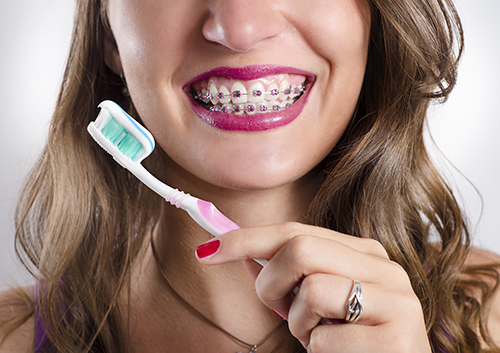Power Chains
January 20th, 2021

By now, you’re very familiar with the basic building blocks of your braces. Brackets, wires, and ligatures are no mystery to you. But suddenly, you’re hearing a brand new term—“power chains.” What exactly are these power chains, and why does your orthodontist think you need them? Let’s see how power chains are *linked* to your orthodontic treatment.
- First, why power chains?
They’re not really chains in the necklace or bike chain sense—in fact, they’re only very rarely made with metal. These chains are most often a string of O ring loops just like your elastic ligatures, attached in a row to resemble a chain.
Chain lengths are tailored to your specific needs. Dr. Brad Elkin, Dr. Joshua Epstein, Dr. George Sargiss, Dr. Martin Epstein, Dr. Sonalee Kapoor and Dr. Carly Kinzer will attach each individual loop in the chain around a single bracket, linking selected teeth together. Chains might stretch across a few teeth, several teeth, or your entire upper or lower arch.
- Second, why power chains?
Because these chains are usually made of the same elastics that your ligatures, or bands, are made from, they want to hold their original shape. They will try to return to that original shape even as they are stretched between your brackets. As they contract, they help move your teeth together.
Over time, just like an over-stretched rubber band, they lose their elasticity, and won’t work as effectively. That’s why you’ll probably get a new power chain whenever you come in to our Freehold, Manalapan or Hightstown, NJ office for an adjustment.
- Third, why power chains?
This is the most important question. How can a power chain improve your smile?
Usually, power chains become part of your treatment after the first phase of alignment. They can be used to help align your teeth or correct your bite, but are most often used to close gaps between the teeth.
You might have a gap after a tooth has been extracted. Or, as your teeth move into their new positions, you might suddenly see noticeable spaces between them. Power chains move the teeth closer together to eliminate these gaps, and do it more quickly than brackets and wires alone can do.
- How long will you need them?
This is something Dr. Brad Elkin, Dr. Joshua Epstein, Dr. George Sargiss, Dr. Martin Epstein, Dr. Sonalee Kapoor and Dr. Carly Kinzer will discuss with you. Whether it’s a matter of weeks or months, your treatment plan is designed to move your teeth into their best positions, and to do it carefully for a lasting, healthy alignment.
- Power chain options
Depending on the size and spacing of your teeth and your treatment plan, these chains usually take one of three forms: closed/continuous, short, and long. The only difference is the distance between the rings.
We will choose the type of chain that’s best for your treatment. Your contribution is to personalize your power chain. Power chains come in a rainbow of colors, allowing you to mix and match. You can even coordinate with your ligatures if you have ties as well as chains. If your goal is to have your braces blend in, various shades of white, silver, or clear colors are available. Want to mix things up? Choose a different color with every adjustment.
- Anything else?
You might experience some discomfort for the first few days with a new power chain, just as you might with any adjustment. Dr. Brad Elkin, Dr. Joshua Epstein, Dr. George Sargiss, Dr. Martin Epstein, Dr. Sonalee Kapoor and Dr. Carly Kinzer will have suggestions for making those first days as comfortable as possible.
Also, like brackets and ligatures, power chains can trap food particles, so be sure to follow our instructions for keeping your teeth and your braces their cleanest.
Now that you’re all caught up on what power chains are and what they can do for you, let’s mention one more benefit. This is a process where you can actually see the gaps between your teeth closing over the weeks you wear your power chains. Keep a selfie record of your progress as you create your beautiful, healthy smile. That’s an em*power*ing experience!







 Website Powered by Sesame 24-7™
Website Powered by Sesame 24-7™